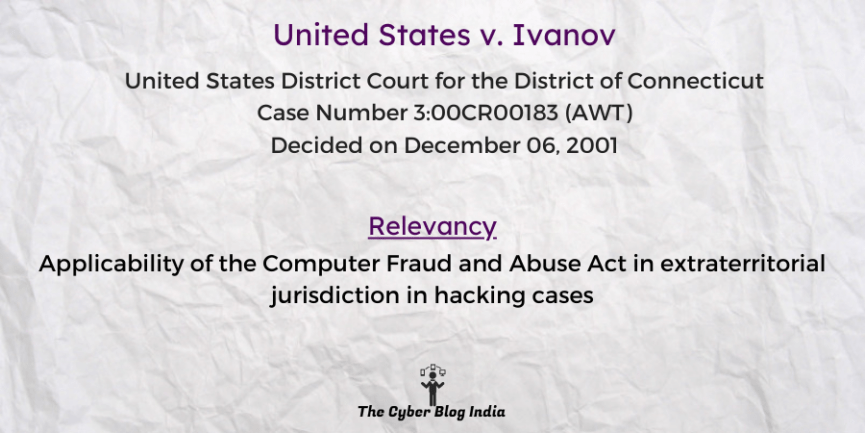United States v. Ivanov

United States of America v. Aleksey Vladimirovich Ivanov
175 F.Supp.2d 367
In the United States District Court for the District of Connecticut
Case Number 3:00CR00183 (AWT)
Before District Judge Thompson
Decided on December 06, 2001
Relevancy of the Case: Applicability of the Computer Fraud and Abuse Act in extraterritorial jurisdiction in hacking cases
Statutes and Provisions Involved
- The Computer Fraud and Abuse Act, 18 U.S.C. § 1030
- The Hobbs Act, 18 U.S.C. § 1951
- The Access Device Statute, 18 U.S.C. § 1029
- The Conspiracy Statute, 18 U.S.C. § 371
Relevant Facts of the Case
- Online Information Bureau, Inc. (“OIB)” is an e-commerce business which assists retail and internet merchants by hosting their websites and processing credit card data. It is a financial transaction clearinghouse since it aggregates and helps in debiting or crediting funds.
- The prosecution’s case states that the defendant hacked into OIB’s systems and obtained root passwords. These root passwords grant users access to and control the entire computer system. The defendant subsequently threatened OIB with the destruction of its computer systems and demanded approximately $10,000 for providing his assistance to make the system secure.
- The defendant communicated his extortion demands through lightrealm.com, a Washington-based internet service provider. Physically, the defendant was present in Russia.
- The defendant has filed this plea to dismiss the case because of the lack of jurisdiction.
Prominent Arguments by the Counsels
- The defendant’s counsel argued that he was physically present in Russia. Therefore, the prosecution cannot charge him under the Hobbs Act or the Computer Fraud and Abuse Act.
Opinion of the Bench
- The impact of substantive offences committed by the defendant is within the US jurisdiction. The computers are physically located at the OIB’s place of business in Vernon, Connecticut.
- The Hobbs Act would be applicable in this case. The act covers all such conduct affecting commerce within the borders of the United States, irrespective of where it has occurred.
- The Access Device Statute and the Conspiracy Statute are meant to be applied extraterritorial.
Final Decision
- The court denied the defendant’s motion for the lack of subject matter jurisdiction.
Anjini Pandey, an undergraduate student at Dr. Ram Manohar Lohiya National Law University, prepared this case summary during her internship with The Cyber Blog India in May/June 2022.
